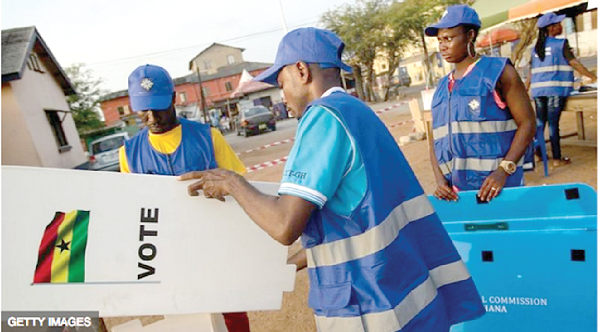
The 2023 District Level Elections
How many Ghanaians are aware of and plan to vote in the upcoming district-level elections which will be held on December 19?
Advertisement
I reproduce below voter turnout rates for our district-level elections taken from a recent news report filed by Edzorna Francis Mensah titled “District Level Elections: Minister worries over persistent low turnout.”
Table 1: Voter turnout, district-level elections
If past voter turnout in our district-level elections is an indication of what to expect, then I share the concerns of those who say voters are not that interested in these elections or not as much as they care about national elections. It is a year away, but the 2024 presidential and parliamentary elections, I would argue, are dominating public conversations and news coverage.
So, what is the issue? Why does it seem that we are not interested?
What we think and how we feel about local government:
1. Satisfaction with local government performance. In 1999, when the Afrobarometer survey asked Ghanaians whether they approved or disapproved of the way their assembly members had performed their jobs, fifty-three per cent (53%) said they approved. By survey round four in 2008, performance approval had improved significantly to sixty-two per cent (62%). Approval rating, however, declined to fifty per cent (50%) in 2012 and further declined to thirty-six per cent (36%) in 2014. In survey round seven (2017), the approval rating improved to fifty-one per cent (51%), but declined to forty per cent (40%) in 2019 and further declined to thirty-six per cent (36%) in 2022.
2. Trust in local government. In 2002, when the Afrobarometer survey asked Ghanaians how much they trusted their local government council, the predominant response (33%) was “just a little.” In subsequent years of the survey, the predominant response looked like this:
3. Perceptions of corruption in local government. In 2005, when the Afrobarometer survey asked Ghanaians how many of their assembly members were involved in corruption, the predominant response (41%) was “some of them.” In subsequent years of the survey, the predominant response category stayed the same, but the percentages changed – 2008 (53%); 2012 (62%); 2014 (40%); 2017 (55%); 2019 (58%); and 2022 (58%).
4. Local government listens. In 2005, when the Afrobarometer survey asked Ghanaians how much of the time assembly members try their best to listen to what ordinary people have to say, only thirty-six per cent (36%) said “often/always”. In subsequent years of the survey, the percentage of Ghanaians who answered with “often/always” were as follows - 2008 (41%); 2012 (19%); 2014 (24%); 2017 (30%); 2019 (23%); and 2022 (35%).
5. Access to information from local government. In 2022, fifty-six per cent (56%) of Ghanaians said it was “not likely at all” when the Afrobarometer survey asked them how likely they could get information about the local development plan and budget from the local office. Another fifty-nine per cent (59%) said it was “not likely at all” that they could get information about local government contracts from the local office.
6. Contact with local government. In 2002, when the Afrobarometer survey asked Ghanaians how often they contact their assembly members for help to solve a problem or to give them their views, eighty-three per cent (83%) said “never”. In subsequent years of the survey, the predominant response category (never) stayed the same, but the percentages changed – 2005 (85%); 2008 (63%); 2012 (68%); 2014 (72%); 2017 (71%); 2019 (70%); and 2022 (64%).


In Summary
How can I sum these observations up? When you are not satisfied with the performance of local government, have low trust in them and perceive corruption among them while feeling they do not listen; or think it is very unlikely to get access to information about local government and rarely contact them on issues, it comes as not a surprise when local government elections have low turnout and attract little interest from Ghanaians. That is the challenge facing our district-level elections.
But we should not accept the status quo and give up on local government. Our local governments have work to do to improve how we have come to feel about them. As they strive to improve, we the citizens must not disengage from the process.
I commend the National Commission for Civic Education for their public education campaign efforts in encouraging Ghanaians to vote in the upcoming district-level elections. Let me add my voice by encouraging you to go out and vote on December 19.
Pull Quote: “But we should not accept the status quo and give up on local government. Our local governments have work to do to improve how we have come to feel about them. As they strive to improve, we the citizens must not disengage from the process.”
The writer is a Democracy and Development fellow at the Ghana Centre for Democratic Development (CDD-Ghana).




